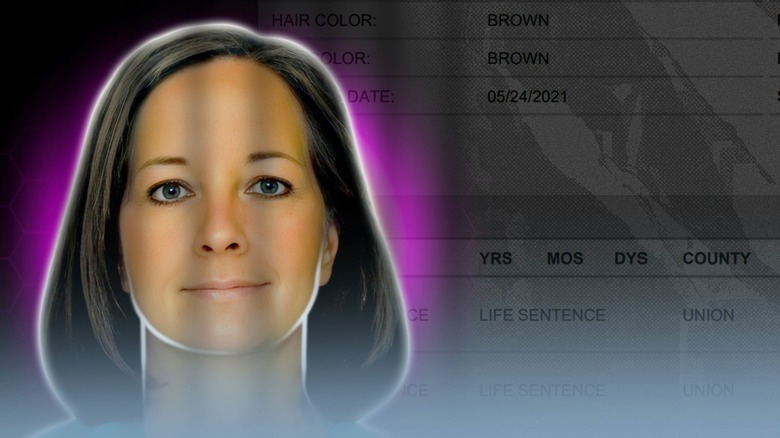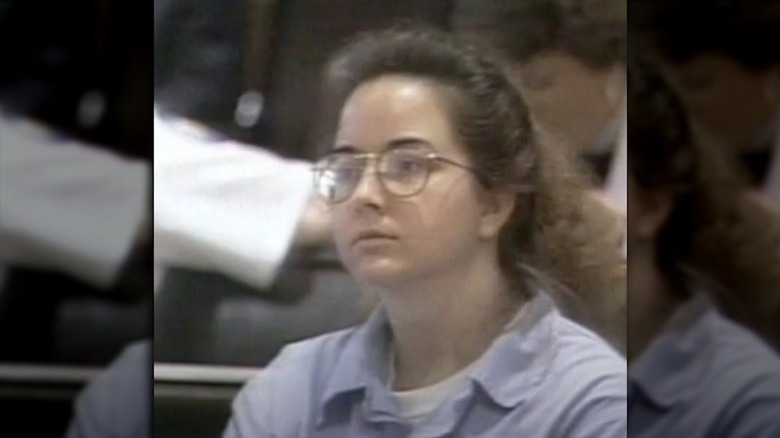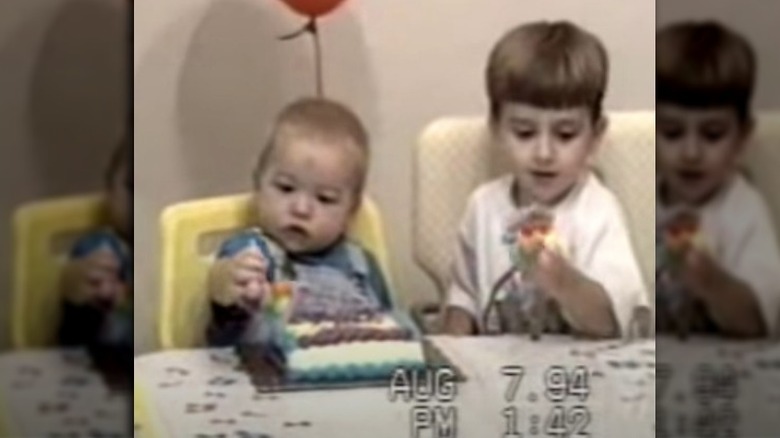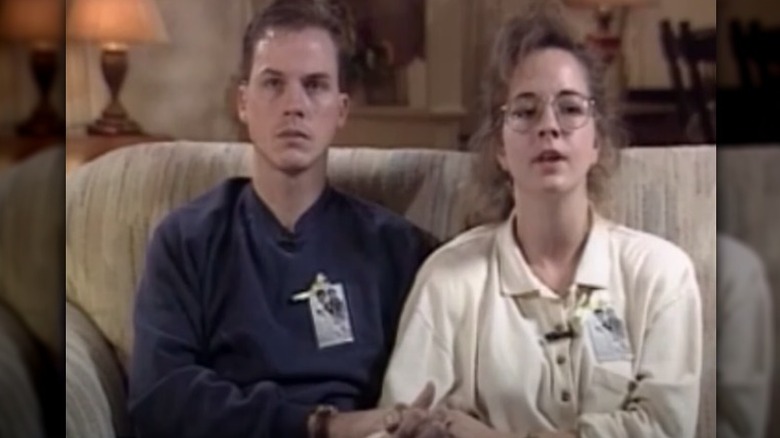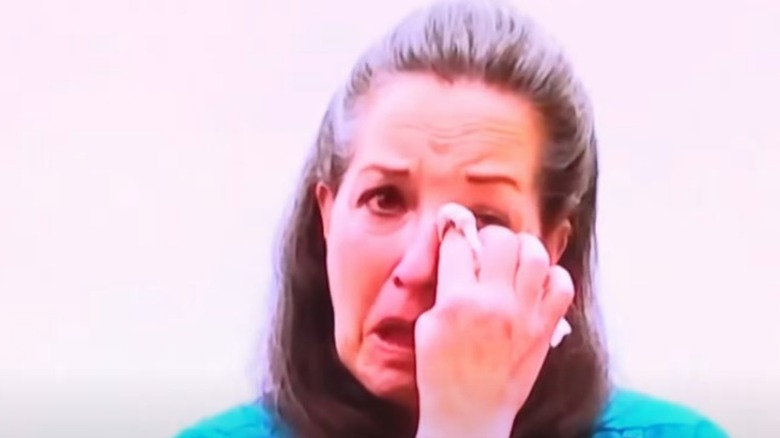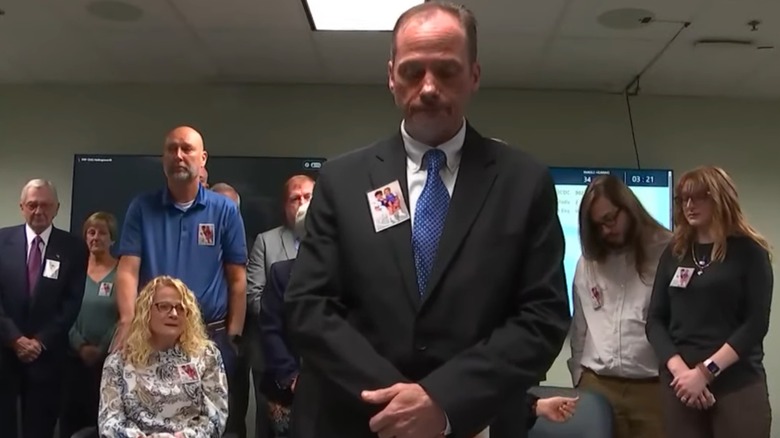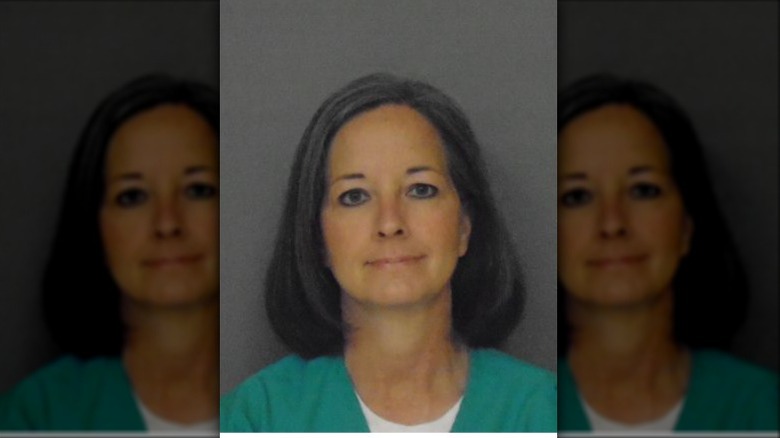Inside Susan Smith's Life In Prison Today
The following article includes mentions of sexual assault, domestic abuse, and suicide.
When it comes to true crime, some of the cases that seem to shock people the most are also the most incomprehensible. Among those are rare examples in which mothers kill their own children. In this (thankfully) small pool, there are still those that stand out in the minds of the public — and perhaps one of the most well-known in the U.S. is convicted murderer Susan Smith, who was found guilty in 1995 for intentionally killing both of her sons.
While the crime itself was unspeakable as is, the aftermath of the murders of Smith's children, 3-year-old Michael and 14-month-old Alex, created an almost unprecedented media frenzy at the time, a good part of it perpetrated by Smith herself. And because of this, Smith has become one of the more divisive and reviled criminals in the pantheon of American true crime, her name a sort of short-hand for the dark, obsessive lengths anyone will go to get what they think they want.
It's been 30 years since Smith was put away behind bars to serve a life sentence, and she became eligible for parole in 2024. So, what has Smith's life been like for well over two decades? And what happened when she got the chance to plead with the parole board to let her set foot into the world again as a free woman? Keep on scrolling to find out more.
Susan Smith's early life was tragic
For the unfamiliar, the murders for which Susan Smith was convicted took place in 1994, when she was 23. Not that it justifies a single thing, but her life wasn't easy. According to TIME, Smith attempted suicide when she was 13, though her mother and Smith's stepfather "refused" to hospitalize her. Her stepfather began sexually abusing her during her high school years, per the outlet.
Though Smith was considered an intelligent and popular student among her peers, officials at her high school knew otherwise. Though the then-teenager reported the ongoing sexual abuse twice to her high school counselor — the first of which resulted in a brief separation between her stepfather, Beverly "Bev" Russell, Jr., who was a "prominent" member of the South Carolina Republican party, and the state's Christian Coalition organization — the charges were dropped. Smith later said the relationship continued until roughly six months before she committed murder, and later revised their relationship as "consensual."
After graduating from high school, she then met David Smith, the man who would become the father of her two children. Per NBC, their marriage was marred by periods of separation, which ended in a final, though unofficial, split — and laid the groundwork for what was to come.
Susan Smith's crimes landed her a life sentence
After Susan Smith and her ex-husband David separated for the final time around 1994, the young woman soon entered what in the beginning was a consensual relationship with a man named Tom Findlay. Findlay, who The New York Times described at the time of Smith's trial as "the son of a rich industrialist," was indeed connected to the place Smith herself worked. Findlay put an end to their relationship in the fall of 1994 — but not before he told Smith, per A&E, that part of their breakup had to do with the fact that he didn't want children. And Smith already had two sons.
Everything came to a head on October 5, 1994, when Smith took her sons out for a ride on a South Carolina night. Hours later, she called emergency services, frantic, and alleged that an unknown Black man had kidnapped 3-year-old Michael and Alex, who had only celebrated his first birthday two months prior. (The racial undertones of Smith's story, which was later proven to be wholly fabricated, were also covered by newspapers like The New York Times.) But as police soon began to realize, the story didn't add up. As NYT summarized, Smith eventually confessed to taking her children to a nearby lake and intentionally "rolling her car down a boat ramp and into the "body of water. She was eventually found guilty of the highly-publicized crime.
Susan Smith struggled to prove herself worthy of parole
After being found guilty for the murder of her sons, convicted killer Susan Smith was sent to prison. Her sentence? Ostensibly, one for the remainder of her life. The catch? It came with the possibility of parole — one that she became eligible for in 2024. And despite reports that Smith hasn't had the most sterling reputation as an inmate during her incarceration at the Leath Correctional Institution in South Carolina, it seems that, a few years earlier, she set her eyes on her meeting with the prison parole board.
According to a People report in 2020, a source inside the prison said that Smith had started "behaving herself" The reason? "She knows that her parole date is four years away and she can't get parole if she isn't being good," the insider added. According to the magazine, however, the cards were stacked against her: aside from her status as a murderer, her criminal record — which was obtained by People — contained information which revealed Smith had "been disciplined at least five times for various infractions." Per People, this included "self-mutilation and the use and possession of narcotics or marijuana," and as a result, each infraction cost her "loss of privileges, including loss of visitation, canteen and telephone privileges." Only time will tell if this will aid in keeping her behind bars for good. We can only hope.
Prison life has been hard for Susan Smith
As mentioned above, Susan Smith has racked up quite a few infractions during her three decades behind bars. These missteps came back to haunt Smith during her tearful parole hearing in November 2024. Her first infraction was back in 1997, and it seems that sights remained set on Smith during her prison stay. In fact, too much attention may have been placed upon the inmate. According to NBC News, it was discovered in 2000 that two prison guards admitted to having sexual relationships with Smith, ultimately resulting in her having to be transferred to a different correctional facility. Although this was used as a mark against her, it should be noted that this is an incredible abuse of power on behalf of the guards.
Susan Smith, a South Carolina woman who admitted to drowning her two children 30 years ago, appeared before a parole board for the first time to make a case for her freedom.
Read more: https://t.co/AhKb3vPvBF pic.twitter.com/JxmEpyFMLZ
— ABC News (@ABC) November 20, 2024
During her tearful parole hearing, Smith was asked questions about the infractions she committed during her time in the South Carolina Department of Corrections. Her weepy response boiled down to an admission of "just stupidity" (via ABC News). Smith confessed, "I know I've made a lot of mistakes in here and I have learned from them." However, after acknowledging her own growth and desire to make amends, there was still more of the parole hearing to get through in her quest to prove she's been reformed.
Susan Smith's 2024 parole hearing was full of tears
On November 20, 2024, Susan Smith participated in her parole hearing through a video link behind bars. Before the parole board could rule, Smith was able to admit that what she did to her two sons, Michael and Alex, was horrible. In footage obtained by NBC News, Smith confesses, "I would give anything if I could go back and change it. ... I'm sorry. I know that's not enough."
Smith's ex-husband and father of the two boys, David Smith, was also in attendance. For his part, he pleaded with the parole board to deny Susan Smith's request to be released. Alongside him were not only his legal team, but members of his family who support his quest to keep his ex-wife behind bars. In his speech to the parole board, David Smith said, "It's been a tough 30 years. This wasn't a tragic mistake ... She purposely meant to end their life." And it seems the parole panel took his words to heart — every member voted unanimously to keep Susan Smith locked up.
What's next for Susan Smith?
After the parole hearing, David Smith mentioned in a press conference that his ex-wife will be able to seek parole again in two years — and when that time comes in 2026, he will return to advocate against her. However, it seems that Susan Smith's legal team might be using these next two years to hatch a different strategy to try and successfully get her freedom.
In 2015, Susan Smith wrote a letter to The State, a local South Carolina newspaper, to try and get control of her own narrative. In it, she claims, "Something went very wrong that night. I was not myself. I was a good mother and I loved my boys. ... There was no motive as it was not even a planned event. I was not in my right mind." She added, "I am not the monster society thinks I am."
Smith's attorney, Tommy A. Thomas, is most likely behind this attempt to try to prove she's a changed woman. Whereas Thomas pointed out the crimes Smith committed were indeed atrocities during her parole hearing, he was quick to mention the horrors Smith herself had to endure throughout her life and how they should be incorporated into better understanding her and how she got here. However, even if Smith were to be released, Thomas said, "I don't think she will ever be able to forgive herself."
If you or someone you know has been the victim of sexual assault, you can call the National Sexual Assault Hotline at 1-800-656-HOPE (4673) or visit RAINN.org for additional resources.
If you or someone you know is dealing with domestic abuse, you can call the National Domestic Violence Hotline at 1−800−799−7233 or TTY 1−800−787−3224. You can also find more information, resources, and support at www.thehotline.org.
If you or someone you know is having suicidal thoughts, please call the National Suicide Prevention Lifeline at 1-800-273-TALK (8255) or text HOME to the Crisis Text Line at 741741.

